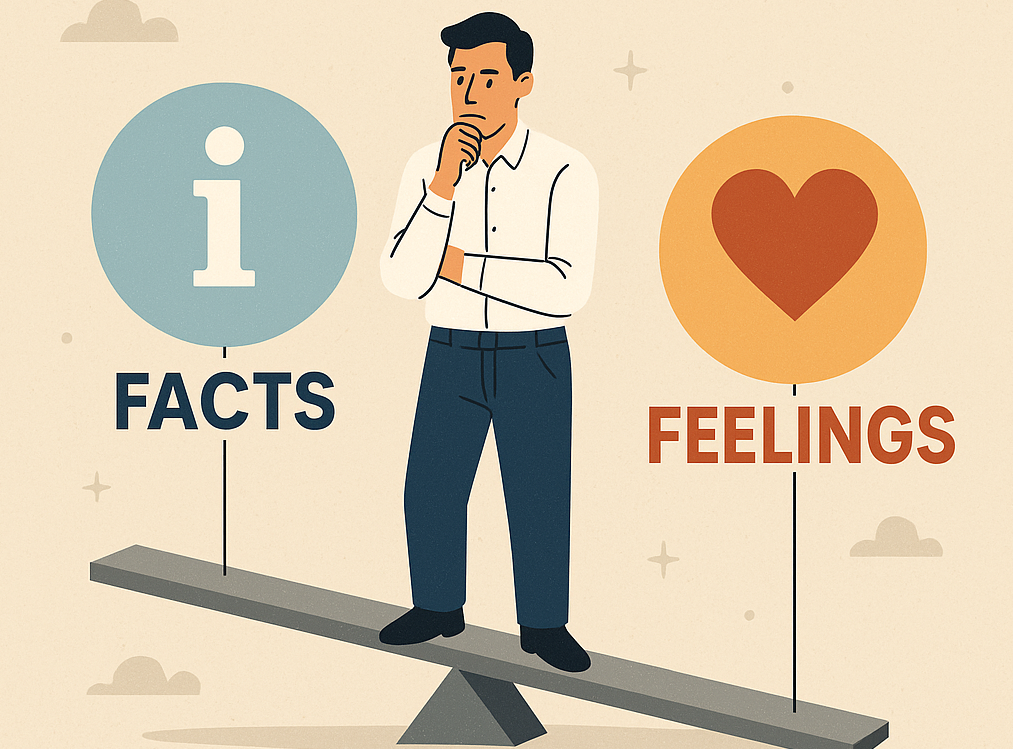
We often wonder about difference between mental faculties and feelings. Folks prefer reasoning over emotion – but does that always lead to better outcomes? Should we prioritize feelings, or focus solely on the facts around? What does it truly mean to live in a world where one should balance emotional experience with objective reality?
In psychology, subjectivity refers to how a person experiences the world from their own perspective. It includes a person’s feelings, thoughts, memories and opinions. Carl Rogers focused on subjectivity in his ‘Client –Centered Therapy‘.He believed that a person’s inner world (how they see and feel life) must be understood to help them grow and heal. If someone says “I feel depressed when I’m alone”, that is a subjective experience. That experience may not happen to everyone but it is real for that person. Others might not understand how intense the experience feels. It might look like just another moment to them, but for the one living it, it can be everything. Objectivity means seeing things as they are, without personal feelings,opinions, or biases getting in the way. It is using facts,evidence, and neutral observation especially in making judgments.Many behaviorists emphasized staying objective while studying behavior. Objective rules and standards are always the same for everyone. For example, in Little Albert experiment researchers observed how fear is learned through visible behaviors. Now the question is: Which matters more – the heart or the mind? Are they equally important or is the conventional notion of following mind is still the right path. Psychology offers fascinating perspective which support to see things in a whole new light.
Researches e explores the balance between facts and feelings. The core concept is challenging to the traditional ideas of ‘just follow your mind’. A well-known study by Dr. Molly Crockett, showed that the brain needs both feelings and logics to make good moral choices. The participants were placed in a lab with moral dilemma on a computer. Forexample, they had to decide whether to sacrifice one person to save five others. The results were striking. It concluded that people who engaged both emotional and rational brain areas made fairer and more thoughtful decisios. Another study, ‘Self-knowledge and the limits of introspection’ was done by Dr.Timothy Wilson. In this research people were asked to write about them then their self-reporting was compared with remarks from their near and peer.
It was found that people overrated their positive aspects and under rate their grey areas. Here we get the crystal clear idea that we may not fully understand ourselves fully by only looking inside. The objective outside feedback is also an integral part of self-perception. At Yale Center for Emotional Intelligence Dr.Marc Brackett studied’ Emotional intelligence (EQ) and self-reflection in the workplace ‘.Researcher compared the performance of employees with higher emotional intelligence with those with lower level. The finding showed people with higher emotional stability were more productiveat the workplace than those with lower EQ.What this research shows is that when you are fully aware of your emotions, you do not react blindly-you stay more objective and clear-headed.
Can we teach our children this delicate balance between the inner and the outer world? Psychology gives a confident yes to this question. Psychologist Jean Piaget showed that children move through different stages of thinking. They develop from self-focused and emotional (subjectivity) to more logical thinking (objectivity).
Another key figure, GeorgeMead, explained that child learn through ‘role –play ‘.For example when playing ‘teacher and student’ they imagine how other think and feel. This playful process teaches them empathy and social expectations. The need of the hour is to comprehend that a healthy childhood is more than just learning ABCs. This is the time to learn emotional and mental balance to grow into a socially aware adult.
In today’s complex world, adults also need to find this right balance to make wise and clear decisions. This goal can be achieved by counseling. In counseling therapist listens to clients feeling (subjective experiences) and help them see those feelings clearly (objective understanding).For example ,someone may feel worthless but the therapist make them recall their achievements based on real life events, which in turn help them rebuild self-esteem with truth.
In long story short, we have seen learned that always following the mid alone isn’t absolute. Both objectivity and subjectivity matter, one shouldn’t overpower the other. Please let me tell you the most critical demand of humanity. Telling someone that their trauma is nothing or they are overeating is not the encouraging statement. It totally ignores the deep truth that subjective experience is unique to each individual. We should remain empathetic and open to what others feel inside. We need liberal approach to accept the others’ emotional experiences with a positive and respectful attitude. It is unavoidable fact objectivity helps us stay grounded, it should not make us rigid or emotionally distant. There is wisdom in our intuitions, in our gut feelings, and in the silent signals of the heart. We should always keep in mind that a balanced mind listens to both reason and emotions. In a nut shell, we can say:‘Balance is not choosing one over the other, but holding both gently’.
—
The writer is an undergraduate student in Psychology and can be reached at shanzashadab@yahoo.com





